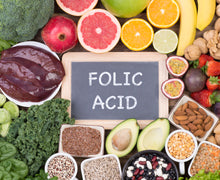
Folic acid, also known as vitamin B9, is one of the most popular recommendations for pregnant women because it helps with the development of the baby’s central nervous system, including the brain and spine. New research from the University of Chicago shows folic acid should probably be taken by those at risk of suicide because it is associated with a decreased risk of suicide attempts.
Professor of Biostatistics and Medicine Robert Gibbons, Ph.D., studied the subject and published the findings in a recent edition of JAMA Psychiatry. He reviewed data from more than 860,000 patients over a two-year period and found those who filled prescriptions for folic acid had a 44% reduction in suicidal events, which included suicide attempts and self-harm.
Government statistics show there were more than 45,000 suicides in the U.S. in 2020. Gibbons believes the findings of his study offer hope in reducing the number of suicides because folic acid is generally inexpensive and very accessible.
"There are no real side effects, it doesn't cost a lot of money, you can get it without a prescription," Gibbons said. "This could potentially save tens of thousands of lives."
Gibbons first became interested in studying folic acid in relation to suicides as the result of a previous study where he and his team looked at more than 900 prescription drugs and their association with increases or decreases in suicide attempts. They found a link between folic acid and a decrease in suicide along with other drugs they expected to be associated with a reduced risk of suicide such as antidepressants, anxiolytics ad antipsychotics.
The initial study made it hard to distinguish individual effects because there were so many different drugs and a large-scale data set. They wanted to narrow the focus with another study which prompted the new work. They first assumed the link between folic acid and reduced suicide attempts was just in women but they realized they were wrong.
"When we first saw this result, we thought it was pregnancy," Gibbons said. "Pregnant women take folic acid, and pregnant women tend to have a low suicide rate, so it's just a false association. So, we just did a quick analysis to restrict it to men. But we saw exactly the same effect in men."
The new study was structured to remove many variables so they accounted for as many confounding factors as possible. They looked as things such as age, sex, mental health diagnosis, other central nervous system drugs and conditions that affect folic acid metabolism. Even after adjusting for those factors they found a decrease in suicide attempts with folic acid.
And the longer it was taken the lower the suicide numbers went. Each month of being prescribed folic acid showed an additional 5% decrease in the risk of suicide during the 24-month period. To be sure it was not just that people who take vitamin supplements and want to improve their health are less likely to commit suicide they looked at vitamin B12 and found no relation to its use and fewer suicide attempts.
Gibbons and his team want to next conduct a large scale randomized controlled trial to further study the association between folic acid and suicide.



